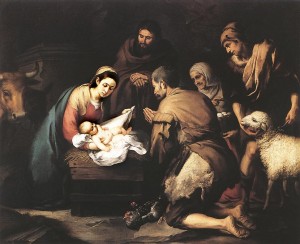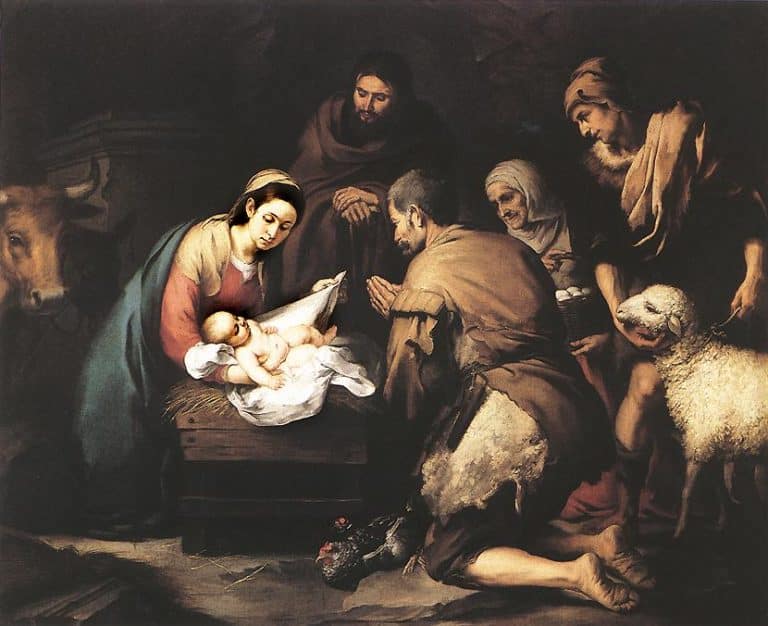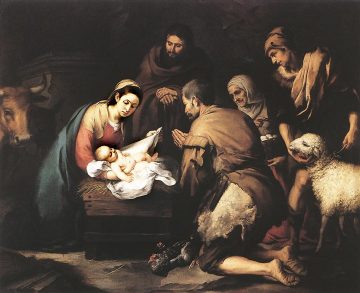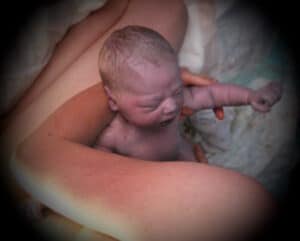Guest post by Sarah
“And now, after the many testimonies which have been given of him, this is the testimony, last of all, which we give of him: That he lives! And this is the gospel, the glad tidings, which the voice out of the heavens bore record unto us – That he came into the world, even Jesus, to be crucified for the world, and to bear the sins of the world, and to sanctify the world, and to cleanse it from all unrighteousness; that through him all might be saved.” (D&C Section 76)
 My son was born on Christmas Eve. His birth came the year after our family’s most disastrous Christmas ever – a fairly remarkable statement, considering my extended family includes evangelical Christians, fundamental Muslims, and militant Atheists. My heart was still heavy with the events of 12 months prior when I cradled him in my arms and thanked a loving Heavenly Father for giving me this child, at exactly this moment, to soothe my troubled soul and let me find, once more, the beauty of Christmas. I looked into those slate-blue eyes and saw he already had all of the wisdom of the world, and he was anxious to share it with me. I kissed that soft spot on his head and cooed, “It’s alright, little one; we don’t have to worry about that just yet.”
My son was born on Christmas Eve. His birth came the year after our family’s most disastrous Christmas ever – a fairly remarkable statement, considering my extended family includes evangelical Christians, fundamental Muslims, and militant Atheists. My heart was still heavy with the events of 12 months prior when I cradled him in my arms and thanked a loving Heavenly Father for giving me this child, at exactly this moment, to soothe my troubled soul and let me find, once more, the beauty of Christmas. I looked into those slate-blue eyes and saw he already had all of the wisdom of the world, and he was anxious to share it with me. I kissed that soft spot on his head and cooed, “It’s alright, little one; we don’t have to worry about that just yet.”
Of course I couldn’t help but think of another mother, who had also cradled her newborn son one Christmas long ago. I marvelled at her courage and wondered if she did not rail at the injustice of it, that her child – so perfect – would have to carry such a heavy burden for us all.
“At the time Joseph Smith received revelations and organized the Church, the vast majority of churches taught that the Saviour’s Atonement would not bring about the salvation of most of mankind. The common precept was that a few would be saved and the overwhelming majority would be doomed to endless tortures of the most awful and unspeakable intensity.The marvellous doctrine revealed to the Prophet Joseph unveiled to us a plan of salvation that is applicable to all mankind.” (“Our Father’s Plan: Big Enough for All His Children,” Quentin L. Cook)
We are taught that Christ spoke in parables, in part so that those who were receptive to the message could find it. Christ’s birth, too, is a parable of the universality of the Atonement of Christ. Consider the principal players:
Mary and Joseph were Jewish at a time when to be Jewish meant to have a very closed social circle, composed only of other Jews. Even Jews who were not “Jewish enough,” like the Samaritans, were outcast. Mary was a young woman, most likely a teenager; Joseph is traditionally portrayed as an older man, possibly a widower. In the eyes of her community, Mary’s pregnancy made her a pariah, unclean and unworthy. Even Joseph’s family might have wanted him to cast her aside. To stand up to their community, to embrace each other even in the midst of this terrible scandal, took a fortitude of spirit and an abundance of love. Surely we should model our own families after their example.
Mary was a biological mother to Jesus Christ; Joseph, a step-father, or perhaps more accurately, an adoptive father. But both rejoiced in this child. We know little of Joseph; but there is nothing to condemn him. He protected his infant son by leading his family into Egypt. When Christ, as a child, stayed behind in Jerusalem, Joseph was worried and sought after him. Mary recognised Joseph’s role in Jesus’s life; she referred to Joseph as Jesus’s “father” (Luke 2:48). It is evident he loved Jesus, that he acted as a father to the child, and that claimed him as his own. In this, we have a beautiful example of the nature of family: Genetic material is irrelevant to the love parents feel for their children.
When the Christ child was born, Mary and Joseph were strangers in a strange city. It may have been Joseph’s ancestral home; but it seems likely they had no friends or family there, nobody they could turn to for shelter or help as Mary’s time drew near.
Or there is this: Perhaps Joseph had family in Bethlehem; but they refused to give aid to the couple. Under Jewish law, Mary’s pregnancy was proof of adultery. “Joseph . . . was minded to put her away privily.” (Matthew 1:19) This in itself shows charity, as the punishment for adultery was death. (Deuteronomy 22:22-24) Joseph received a personal revelation that Mary’s child was divine; but perhaps his family was not ready to believe it.
They were shown compassion by an innkeeper, who, although he could not find them a room, nonetheless did what he could to provide them with some shelter. The stable was most likely his own personal space – not his home; but still a part of his private sphere. He welcomed these strangers and, while his hospitality was perhaps lacking, it was at least something. Can we condemn him, when our own governments seek to turn away those in need?
Mary and Joseph were occupied people, in an occupied land. They were poor; although, as Joseph was a skilled tradesman, perhaps they were not as poor as others. Their position was perilous; they had no civil rights. Politically, they were voiceless. These were the circumstances of Christ’s birth – a lowly, unimportant child with parents who were already in disgrace. Still, the angels glorified in His coming. Heavenly hosts rejoiced in His birth, and shared the glad tidings with others.
Amongst them, the shepherds: These shepherds, men and women, were almost certainly Bedouin. Bethlehem has always been an Arab town; and Bedouins have always been shepherds. Poor and nomadic, Bedouins are often despised, or at least merely tolerated. They came, these poor Arab shepherds, to worship a Jewish child. Imagine their trepidation – Would they be welcomed there? Or would they be turned away? They came because they had been commanded to; they came because they had faith. They were blessed because of their obedience and their faith. Were there others who also heard the call, and dismissed it?
Consider, finally, the wise men. We know little about them. We know that Oman was the centre of trade for frankincense at the time, and that myrrh is native to Ethiopia, Somalia, Eritrea, and Yemen. They were men of science, as evidenced by their knowledge of astronomy, and so perhaps they could have come from Egypt or Persia, both centres of knowledge at the time. Then, too, there is a tradition that they were Chinese. They were probably not Jewish – certainly, they would not have been accepted as such by the people in the Holy Land. They may or may not have been kings; but they were wealthy, and felt at ease in the company of kings, and were probably leaders in their communities. These men, possibly with wives and servants at their sides, were educated, wealthy elites. They knelt at the side of a powerless child. Along with the impoverished and scorned shepherds, and the glorified heavenly hosts, they testified of His mission and His divinity.
Men and women; wealthy and poor; educated and uneducated; Jewish, Arab, Chinese, and African; the powerful and the powerless; families comprised of every kind of love and commitment; the sinner and the sanctified – all who hearkened the signs rejoiced in the birth of the Christ child. Has any story ever been more inclusive?
“And behold, there was a man in Jerusalem, whose name was Simeon; and the same man was just and devout . . . And he came by the Spirit into the temple: and when the parents brought in the child Jesus . . . then took he him up in his arms, and blessed God, and said . . . Mine eyes have seen thy salvation, which thou has prepared before the face of all people; a light to lighten the Gentiles, and the glory of the people Israel. And Joseph and his mother marvelled at those things which were spoken of him. And Simeon blessed them, and said unto Mary his mother, Behold, this child is set for the fall and rising again of many Israel . . . Yea, a sword shall pierce through thy own soul also.” (Luke 2:25-35)
Simeon knew: The Atonement is for all of us. That mysterious and pivotal moment happened, not just for a narrow and select few, but for the world entire. This is the true meaning of the Nativity vignette. Christ came for us all – men and women, wealthy and poor, educated and uneducated, Jewish, Arab, Chinese, African, the powerful and the powerless. There is not one “right” kind of person – His redemptive grace is a gift, freely offered to each of us.
It came, no doubt, at great cost to his earthly parents. Mary and Joseph both would have felt the sting of that sword as it pierced their very souls. The courage it would take to raise a child from infancy, knowing in some small measure the sorrow and heartache that lay ahead! I thought of that, too, as I cradled my newborn son on his very first Christmas day, and thanked a loving Heavenly Father for the gift of ignorance.
On Christmas Eve, after my son has opened his presents and blown out his birthday candles, after we have left a slice of cake out for Santa, we will cuddle together to read the Nativity story. My daughter will get distracted, and remember the Christmas morning she heard Santa’s reindeer on the roof. My son will wonder if Santa might surprise him with a dog. After they are nestled all snug in their beds, I will come downstairs, and turn towards the nativity set, and ponder again that glorious night in Bethlehem:
“Long lay the world in sin and error pining, till he appear’d and the soul felt its worth.” (“O Holy Night”)
For what worth has a soul, without the divine night, two millennia ago, when a babe was born in a stable in Bethlehem? What worth has a soul, without Gethsemane? What worth has a soul, without Golgotha?
What worth has a soul, without that glorious morning when the stone was rolled away from the tomb?
“Remember the worth of souls is great in the sight of God.” (D&C 18:10)
“Greater love hath no man than this, that a man lay down his life for his friends.” (John 15:13) But Christ did not just lay down His life for his friends – He laid down His life for those who mock Him, for those who despise Him, for those who use Him. Because this is the worth of a soul – This is the worth of your soul, my soul, every soul: “He suffered the pain of all men, that all men might repent and come unto Him.” (D&C 18:11)
On that night in Bethlehem, there were some who gathered to wonder at this tiny child who came to save us all, but there were many more who did not. Too tired from a day’s labour; too stubborn to listen to the angels; too caught up in earthly troubles to search for a star in the heaven – they missed the joy of sharing in the Saviour’s birth. He came for those, too – those who doubted; those who could not believe; those who had Martha’s hands, too busy to rest from their toil. He was born, this lowly, unimportant child. He lived, and He died, and He rose again.
“God be thanked for the matchless gift of His divine Son.” (“The Living Christ, The Testimony of the Apostles.”






10 Responses
This is beautiful, quimby and just what I needed to remind me of the sacred and inclusive nature of the birth story. To me, the inclusiveness is just as, if not more sacred than what is typically the focus of the retelling of the christmas story.
Thank you so much for this!
I love this. I had never thought about the possibility that Joseph and Mary were deliberately shunned, but it might have been that way. Were his family hating the sin? Did they think that perhaps Joseph was the father, since he didn’t put her away, but had violated the law of chastity by not waiting? Even if that is not the reason for their stay at the inn, I could well imagine it being the case for some family members. It makes me love the idea of their little family all the more — committed to each other and converted to the visions they had had despite obstacles.
That was actually an idea that occurred to me after reading some Jewish commentary on the social implications of Mary’s pregnancy. It seems likely that many in her community would’ve shunned her, if they thought she had considered adultery. The scripture from Deuteronomy that I reference actually refers directly to rape; it was referenced in the Jewish commentary. (Rape within a city wall is considered adultery because if she screamed, someone would’ve heard her and come to her rescue; both parties are to be put to death. Rape outside of the city wall is punishable by the death of the rapist but not the victim, because had she screamed nobody would’ve heard her to come to her rescue. There’s a whole other post to be written there.) That jarred me a bit and also made me think more about the particulars of Mary’s life – How much of it was confined to the city, or even one small quarter of the city? What was her life like, before the Annunciation?
I also read a commentary from a Catholic source that spoke more in general terms of how common it was for women to become pregnant during this period of betrothal, and what typically happened. According to that commentary, it wasn’t uncommon; and it wasn’t considered adultery as long as the betrothed was the father – basically at any time during the betrothal the couple could start living together; sex wasn’t supposed to happen until they’d started living together; but it was accepted that sometimes these things happened. (This differs somewhat to what I was taught in Seminary, where I was taught there was a set time period for the betrothal.) It was a scandal; but kind of on the order of a Mormon being caught at Starbucks – “Someone had better see their bishop!”
The key difference is that Joseph was not the father of Mary’s child, and knew that he could not be the father. I suppose a lot of the community response would’ve depended on his own reaction. We know only that he wanted to put her away quietly. To my mind that doesn’t really clarify the way he reacted to the news. I can’t really base this on anything, but my feeling is that he probably told his family and close friends he wasn’t the father almost as soon as he found out about the pregnancy, but didn’t say much of anything to the community at large, and once he’d received his own revelation, was happy for everyone else to think he was the father. I have no real evidence for this – but to me, from Joseph’s perspective, finding out your intended was pregnant, and knowing you’re not the father, seems like a pretty tough, punch-t0-the-gut sort of thing to accept; I think most people in that situation would go to their families and close friends and express that sense of betrayal. But the fact that he wanted to put her away privately, instead of making an example out of her, also indicates that he probably didn’t denounce her to the community at large; he probably felt it was none of their business.
To me, then, it seems likely that his immediate family and close friends knew he wasn’t the father; I can easily imagine that if they had relatives in Bethlehem the news would’ve reached them, too, and Mary would’ve been pretty unpopular with them. I mean, think about it – if your son came to you and said, “Uh, Mom, Chloe’s pregnant, and I’m not the dad, but it’s okay, an angel told her she’s having God’s baby” would you really welcome Chloe with open arms or would you think some kind of mean things about her? (And I thought my family get-togethers were rough!)
When I was bouncing ideas for this post off my mother, I pointed out that Mary’s family must’ve believed her; after all, they sent her to her cousin Elizabeth, who received her into her home; neither seems likely if they felt she had committed adultery. And clearly we know Elizabeth received her own testimony of the divinity of Mary’s child. My mother responded that she felt Mary must have been such a remarkable young woman, her own immediate family probably took her word for it. It’s interesting to think of how much her reputation, pre-pregnancy, would’ve played in the community response to her pregnancy. Did the people around her just assume it was Joseph’s baby? Was there a lot of finger-pointing and gossiping? I imagine there would’ve been that one Mean Girl who would’ve kind of delighted in it – you know, “Ooooh, and everyone thought Mary was so perfect!”
That is so interesting! Thank you for the added detail! And you’re right. There probably was that mean girl. Or at very least the pretend pity that had a dose of smug under it. Going to Egypt might have been a relief.
“Christ came for us all – men and women, wealthy and poor, educated and uneducated, Jewish, Arab, Chinese, African, the powerful and the powerless. There is not one “right” kind of person – His redemptive grace is a gift, freely offered to each of us.”
This is a terrific takeaway of the Christmas story – -the wildly inclusive nature of it. If I ever give a lesson or sacrament meeting talk on it, I’m definitely going to hit on this theme you’ve drawn out so well. Thanks, Quimby!
Oh Quimby! I’ve missed your writing so much! I have often felt that, as a culture who retells the Christmas story every year, we miss the opportunity to focus on the extraordinary role Joseph played in all this given his time and culture. (I swear we hear more about the generous innkeeper than Joseph.)
I hope I get to hear a talk like this in my ward or stake devotional this Christmas. The theme of inclusivity and love and acceptance is breathtaking here.
Thank you.
On the Joseph part I especially loved the line about how it might be best to think of him as an adoptive father, rather than a step father. It feels more tender, and closer to the truth. Thank you. For all of it.
[…] comprehended in Christmases past. Having been inspired by the posts of spiritual strength (here and here), practical wisdom (here and here), and rhythmical words from the Exponent Christmas Series, I will […]
[…] Post by Quimby. Quimby’s previous posts are here, here and […]
[…] The Christmas nativity story is a parable about how we can #LightTheWorld by giving of ourselves… […]